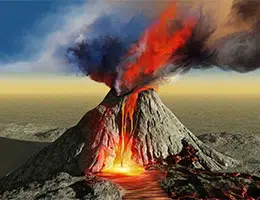 A phenomenon is called a manifestation that is perceptible or that an individual registers in his or her consciousness. Natural , for its part, is that which is typical of nature (as opposed to that which is artificial, constructed by human beings).
A phenomenon is called a manifestation that is perceptible or that an individual registers in his or her consciousness. Natural , for its part, is that which is typical of nature (as opposed to that which is artificial, constructed by human beings).
A natural phenomenon , therefore, is an event that is generated without human intervention . It is a process or event produced by nature whose consequences can be very varied.
There are natural phenomena that are everyday and are part of people's daily lives. Rain , for example, is a natural phenomenon that does not usually bring major complications, regardless of the fact that there are exceptions. Other natural phenomena, however, are less frequent, such as an earthquake or a tornado .
Many times natural phenomena can be forecast : that is, foreseen. In this way, it is possible to prepare for its potential effects and minimize damage. Let's take the case of a hurricane , which is a natural phenomenon consisting of the development of very intense winds that turn into a whirlwind . Meteorologists are able to anticipate when a hurricane may reach a certain territory: in this way, the area can be evacuated or certain protective measures taken.
It is important to mention that the eventual tragic consequences of natural phenomena can be related to human activity . A volcanic eruption is a natural phenomenon, but if man decides to build a town at the foot of an active volcano and then the eruption causes a disaster, there will be human responsibility. On the other hand, if there is no urbanization around the volcano, the eruption may not cause any tragedy.
And in this case the concept of tragedy comes into play, which is very useful to understand the impact of natural phenomena on the planet. A tragedy is an event or situation that is regrettable because it negatively affects a community or a person, but this concept is typical of human beings; Although it can include other species if an accident suffered by one of its individuals causes us sadness (such as when an animal we loved dies), we use this term, since they probably see life differently.
 That said, it is important to understand that for our species a flood can be a tragedy, just like a fire or an earthquake, but we are not sure that other animals interpret it in the same way: no matter how terrible and devastating a natural phenomenon may be, of these characteristics for the beings that inhabit the forests, for example, perhaps they accept it as part of life while we take it as a misfortune and this adds weight to us when it comes to facing it.
That said, it is important to understand that for our species a flood can be a tragedy, just like a fire or an earthquake, but we are not sure that other animals interpret it in the same way: no matter how terrible and devastating a natural phenomenon may be, of these characteristics for the beings that inhabit the forests, for example, perhaps they accept it as part of life while we take it as a misfortune and this adds weight to us when it comes to facing it.
Returning to what was said in a previous paragraph, if we did not build houses on unstable land or in areas that tend to suffer floods, for example, these and other natural phenomena would go unnoticed by us and would not become true tragedies. The same can be said of those cities that were built in regions of frequent seismic movements.
In these cases, unlike a common rain, it is referred to as an extreme natural phenomenon , and it is known that the catastrophes that we associate with them could be reduced if we paid more attention to the territory. In this context, there are groups of people who fight to reduce the risk of natural disasters, and to do so they propose different strategic objectives that largely aim to minimize the economic losses that arise as a result of these disastrous events.
Given that natural phenomena are inevitable, the only thing we can do is ensure that we reduce their consequences to a minimum, and for this, territorial planning and management are essential.
